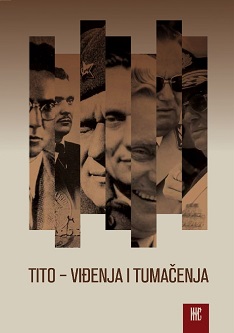Jugoslovenska posleratna emigracija i Josip Broz Tito. Naša reč o sukobu sa IB-om 1948-1949.
The Yugoslav Post-War Emigration and Josip Broz Tito. Naša reč about the Conflict with the Informbuerau 1948-1949
Author(s): Mira Radojević
Subject(s): History of ideas, Political history, Government/Political systems, WW II and following years (1940 - 1949), History of Communism, Sociology of Politics
Published by: Institut za noviju istoriju Srbije
Keywords: Yugoslavia; West; emigration; ideological opponents; Josip Broz Tito; Communist Party of Yugoslavia; totalitarism; Informbuerau; conflict;
Summary/Abstract: In numerous and variegated circles of the post-war Yugoslav emigration the union „Liberation" and its mouthpiece Naša reč were recognizable for their consequential Yugoslavism and democratism which included decisive opposition to building fronts exclusively on anti-communism, without championing democratic changes. For the same reason they also refused cooperation with all right-wing forces, remnants of fascist groups who used the idea of unified anti-communist forces in order to try to avoid responsibility for the support they lent to nazism and fascism during the war. The attitude towards communism and the communist regime in Yugoslavia was shaped at the time of the incipient conflict of the Yugoslav communist party and the state with the Informbuereau, the Soviet Union and with Stalin personally. Not knowing the real causes of the conflict and not knowing how deep the consequences of the rifts opened in the hitherto strictly controlled communist system could be, the „Liberation" and Naša reč considered its outcome important for communist parties and regimes of the countries of „people's democracy" but not for the „enslaved" peoples in them who could find salvation from communist rule only in a democratic system. Therefore western countries were not expected to help Josip Broz Tito, the first man of the Yugoslav party and the state to resist Stalin more easily, but to lend support to democratic emigration and adherents of democracy in the country. The adopted views didn’t remain unchanged, chained by ideological exclusivism and intolerance. Events, time and witnessing the end of certain historical processes caused many previous opinions to be subject to subsequent analysis. Views on Tito and his role changed too. From initial total condemnation and harsh moral judgement, by the end of his life one came to recognize the contribution that he and the party he headed, gave first during the anti-fascist struggle and then in opposing the intentions of the Informbuereau and Stalin. Still, as the most important was seen the fact that he „had built himself in" the whole post-war regime, so that his period in power can be called „Tito’s personal era".
Book: Tito - Viđenja i tumačenja
- Page Range: 101-116
- Page Count: 16
- Publication Year: 2011
- Language: Serbian
- Content File-PDF

